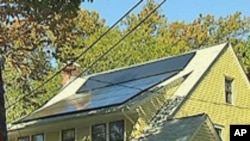As jobs disappear across the United States, advocates of solar energy say their industry can employ hundreds of thousands. But analysts say that to establish a hold on the world market, the U.S. must catch up fast.
Every day, Rhone Resch and his wife Lisa track the electricity they use at home.
"On my phone I can zoom in and get a close-up to see how much electricity we are producing... we have had a pretty good day so far."
Resch even tracks his electricity use when he's not at home. "And I can do this from any computer or any cell phone in the world," he states, "So when I am at work, I have the ability to check out and make sure my solar system is producing the way I expect it to."
A few years back, this Washington, D.C. homeowner installed 36 solar panels on his roof. They generate almost 100 percent of his family's electricity.
The system cost about $35,000, but Resch got almost $19,000 back in local rebates and a federal tax credit.
With almost $100 a month in electricity savings, Resch says his system is a money saver. "We want to reduce our dependency on foreign energy sources, and in this case we are growing our energy right here. It's on our roof," he explains, "It really does not get more American than that."
Resch is a solar fanatic. He leads the U.S. solar industry's lobbying group. He says solar can provide hundreds of thousands of jobs for U.S.workers. "And these are high quality jobs. These are electricians and plumbers and roofers, carpenters. Those who have been let go by the housing industry can find jobs in the solar energy industry," he said.
On this day, workers in Virginia are building a solar energy system on this new homeless shelter. It has energy efficient appliances throughout.
The federal stimulus, passed by Congress this year, is funding the project. In the stimulus, $80 million are earmarked for clean energy investments.
Jim Pierobon is a vice president of Standard Solar, which installs solar panels. "The incentives at the federal, state and local level are literally bringing buyers almost out of the woodwork I shall say…" he said.
Pierobon says his company has grown from 15 employees in mid 2008 to almost 75 today.
But in the past decade, the U.S. has fallen behind its fiercest solar competitors, Germany, Japan and China, according to industry analysts.
Resch calls for greater tax incentives and low cost loans for businesses investing in solar, so the industry can charge ahead much like U.S. Internet companies did in the 1990s.
"We invented this technology. It's a God-given right to make sure that the jobs are created here in the United States," he said.
The solar industry supplies less than one percent of American electricity today. But green tech watchers say the potential is as real as the sun is shining.




